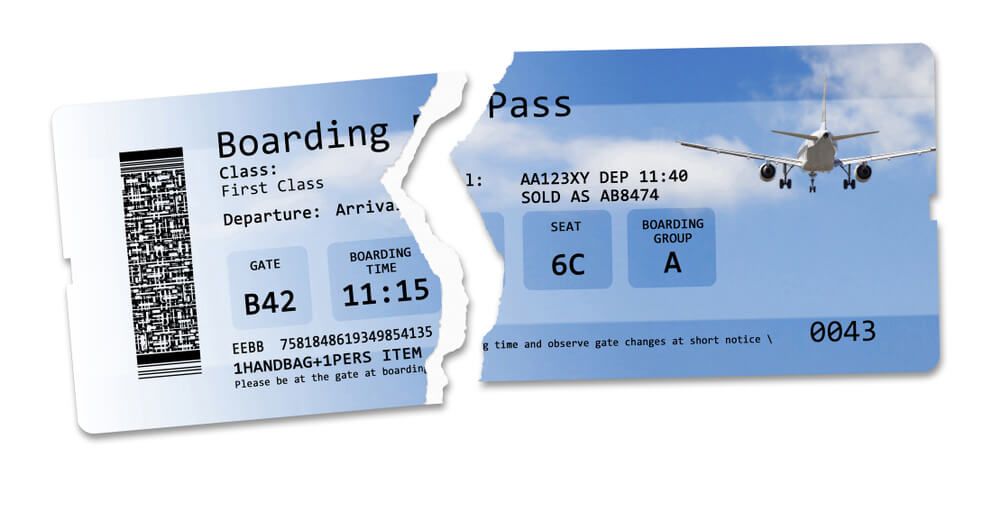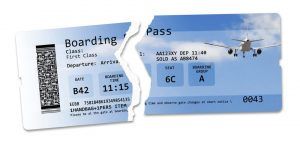One of life’s biggest disappointments is having your holiday cancelled. Excitement builds, you buy a whole bunch of new clothes, and often pay an arm and a leg just to get there – only to have it ripped from your grasp last minute.
Losing money from a holiday cancellation can also result in financial hardship which may lead you to seeing debt help in the form of an IVA, Trust Deed or Debt Management Plan.
However, once you come to terms with the fact that you won’t be getting away, it’s important that you start taking the steps to get your money back. Whether you’ve booked a full package holiday, or even just the flights, there are several ways in which you might be protected against financial loss.
As such, we’ve created the handy guide below to show you just what to do to get your money back…
Are you struggling with debt?
We have a wide range of debt management solutions that could help you write off up to 81% of your debts
Check if you qualifyAir travel
Companies selling travel package holidays should hold an Air Travel Organiser’s Licence (ATOL), so it is always best to check if your travel company was ATOL protected.
The purpose of this licence is to refund bookings and protect you against being stranded abroad. A copy of the ATOL certification should have been sent to you via email/post at the booking stage.
Non-air travel
For those companies selling non-air travel package holidays such as cruises or rail holidays, it’s best to check if they are covered by the Association of British Travel Agents (ABTA).
This protects you if a company should go out of business, offering either a refund or other options that will allow you to still go on holiday.
Travel insurance
Wide-ranging private travel insurance policies are inclusive of events specific to the trip you are going on. This means that issues such as lost or stolen luggage, delays and even cancellation due to unforeseen circumstances such as adverse weather conditions may be covered by your policy.
As such, we advise checking with your insurance provider to check if you are covered.
Flights only
In some cases, ATOL protection can cover some flight only holidays, which does mean you’d have to deal with your accommodation separately. You may also be covered under ABTA on bookings inside the European Economic Area (EEA). Check with your booking agent to find out what you’re entitled to.
Hotel bookings made with a credit card are covered to an extent by the card provider under Section 75 of the Consumer Credit Act. Clauses to this cover typically include missed accommodation due to cancelled flights, however, the provider must be at fault. If you find yourself in this situation, contact your credit card company to find out if you’re covered.
Partial payment
Partial payments may be covered depending on whether you’re covered by ATOL, ABTA or by your credit card provider. If the holiday is cancelled because the travel company has gone bust, registering as a creditor in order to gain a refund may be an option for you.
Visit www.gov.uk/register-creditor-bankruptcy for information on how to reclaim money as part of the company’s bankruptcy proceedings.
Cancelled before departure
Cover may be available if the details of a package holiday are significantly altered or if the holiday is cancelled by the travel company – for any reason – in advance of the departure date.
Regulations such as ATOL, ABTA and Package Travel and Linked Travel Arrangements 2018, ensure that consumers have the right to options in these situations. This includes:
- A full refund with no cancellation
- The offer of an alternative inferior holiday with a refund covering the price difference
- The offer of a superior holiday at no extra cost
Check with your holiday provider to find out more details and what you could be entitled to.
Stranded abroad
In line with consumer regulations, package holidays booked in the UK travelling to areas within the EEA are covered by the UK Government.
In the event of a travel company collapse, the Civil Aviation Authority (CAA) will step in to ensure that all holiday makes are able to return home via alternative flights. In these instances, contact your booking company for more details.
Accommodation payments
A lot of people may be wondering ‘do I need to pay again for accommodation?’. Well, depending on the circumstances, the answer is likely no.
In the event of a travel company going bust, all package holidays booked in the UK for travel within the EEA will be covered by the CAA, which means that they will pay for your accommodation.
Unspent gift cards/travel vouchers
In the event that a travel company collapses, there is a possibility that money spent on unused gift cards or vouchers may be reclaimed through the bank or credit card provider.
A refund is unlikely, however, if you paid for the card/voucher in cash.
Self-cancellation
Deposits for package holidays are usually non-refundable, as are full refunds. However, in the event of illness or bereavement, some travel companies may allow a change of name on tickets.
Private travel insurance policies may cover cancellations due to circumstances such as personal injury or redundancy. Written proof from a doctor or employer may be needed in these cases, however.
Get debt help nowSo, if you’ve been caught out by recent events in the travel industry, follow our steps above. You may be covered in more ways than you think.
To find out more about the solutions we provide, such as IVA’s, Trust Deed‘s and Debt Management Plans call us today and speak to one of our friendly advisors.





